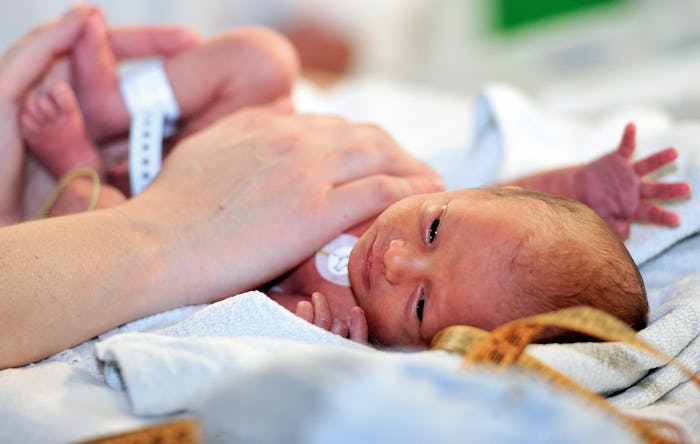
Cuddling Preemies Could Help Them For Decades, According To Heartwarming Study
It's not as if parents needed another reason to snuggle with their babies, but a new study has found that cuddling preemies could help them for decades, according to The Huffington Post. The study, which began in 1993, followed hundreds of premature infants born in Colombia, and investigated whether "Kangaroo Mother Care," or KMC, had any benefits on the babies' health. Now, 20 years later, they're still seeing positive results. The care method was originally developed as an inexpensive, outpatient alternative to incubation, and as it turns out, it may actually be better.
KMC is a three-pronged approach that includes prolonged skin-to-skin contact with the infant, exclusive breastfeeding when possible, and early discharge from the hospital, with follow-up. The early benefits of skin-to-skin contact have been well-established for quite some time, so much so that some hospitals even outsource the job to volunteer cuddlers for babies whose parents aren't always available. According to Fit Pregnancy, skin-to-skin contact can help preemies learn to regulate their body temperature, and it can also promote healthy weight gain and brain development. The Columbia study found that, after one year, "morbidity, mortality, growth, development, and other selected health-related outcomes [for babies receiving KMC] were at least as good as or better than those obtained with usual care."
But it seems that there are long-term benefits to cuddling, as well. The study noted that when premature and low birth weight infants grow up, they're more at risk for "neurologic and behavioral impairment," as well as "cognitive deficits, poor academic performance, or attention problems," and are "less socially competent" than their peers. But after going back and analyzing the study participants 20 years later, the recipients of KMC were found to have "reduced hyperactivity, aggressiveness, externalization, and socio-deviant conduct" than the control group. When the KMC babies' brains were imaged, they were found to have "larger volume of the left caudate nucleus," an area of the brain linked to learning and memory, according to Healthline.
This echoes the findings of a 2012 Canadian study on KMC, which was admittedly conducted among a much smaller group. The study compared three groups of adolescents: 21 premature babies who had received KMC, 18 who had not, and nine babies born full-term, for control. It found that the preemies who received KMC had better brain motor function than those who had not, and their brain function was, in fact, comparable to the full-term babies. A causal relationship has yet to be proven by either study, but come on, it's cuddling babies; what do you have to lose?